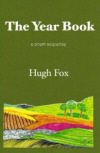The Year Book
Boston area poet Doug Holder noted the recent death of Hugh Fox with a blog post in which he remarks, “Whatever you say about Fox, he wasn’t a cliché of a man—he was a total original. He was a PhD with a big disdain for the academy; his breadth of knowledge left me breathless; he could be incredibly kind and incredibly rude, but I loved him warts and all.” He continues a little further on, “I asked Fox a few years ago what he would like to be remembered for. He told me: ‘That I reminded people to take a close look and engage the world around them.’ Fox took it all in: from sex, the Aztecs, religion, the meaning of being, the meaning of meaning…you name it.” On all these counts, The Year Book doesn’t disappoint.
Boston area poet Doug Holder noted the recent death of Hugh Fox with a blog post in which he remarks, “Whatever you say about Fox, he wasn’t a cliché of a man—he was a total original. He was a PhD with a big disdain for the academy; his breadth of knowledge left me breathless; he could be incredibly kind and incredibly rude, but I loved him warts and all.” He continues a little further on, “I asked Fox a few years ago what he would like to be remembered for. He told me: ‘That I reminded people to take a close look and engage the world around them.’ Fox took it all in: from sex, the Aztecs, religion, the meaning of being, the meaning of meaning…you name it.” On all these counts, The Year Book doesn’t disappoint.
I have no idea whether or not this is to be Fox’s final single volume of poems published, but it certainly is a suitable “last poems.” Most of the writing appears to have occurred a decade ago when Fox was approaching his 69th year, and the foreboding awareness of death is heavily spread throughout the book: “All day the furry ball monsters beside me, Death, death, death, death, and then, end of day, this huge woolly-headed cloud across the sun, and for a moment, eyes, eyes, eyes and nothing else…”
However, so too is sex, for as many times as Fox mentions his old loves, deceased or on their way, or remembers the passing of friends and associates from the university, he’s also to be found fondly remarking on the beauty of a nineteen-year-old daughter of a friend, “looking overwhelmingly sexy with her black lycra legs and red shoes,” or pondering his chances of wooing the recently widowed: “see Sophia, would like to make her into my fuck-slut now that he’s gone.” It’s clear that Fox confronts life head-on with a furious roar.
Fox consistently allows the present act of the writing to lead itself on, catching the momentary spark between memory and spoken occasion, the now with the then. His writing imperceptibly follows the weave of his thoughts, leaping along:
Dark by six, by six-thirty it seems like midnight, feeling the ancient panic that the sun is dying and needs to be revived by chests being cut open and hearts cut out, held up, still beating, to the dying sun, so careful, the right heel and the right texture of the black suede, the right (ivory) makeup base, the right sauce and the perfect cooking time, “Is that the Jewish cemetery?” she asks me as we drive by in the dark, “I don’t think there is a Jewish cemetery, just a corner in a regular cemetery, maybe that’s the one, I don’t know,” thinking about Schönberg today, Allen Berg, the Schönbrunn Palace, Kokoshka, Richard Strauss, Neanderthal Man coming from the Valley of Neander, which was a name stuck on this place in Germany by a Greekophile, Expressionism and Atonalism and Der Rosenkavalier slowly merging with the Paleolithic, and then nothing at all.
Fox is the sort of writer one does fall in love with, bowled over by charms you’d never guess would have worked and willingly ignoring behaviors and inclinations that in the abstract would be instant deal busters. Fox knows this and utilizes it to his full advantage. His work is an affirmation of life that deserves a lasting embrace: in other words, full tilt or nothing. There are some rather startling revelations here and there, mainly sexual in nature, but these more than likely will prove to be nothing Fox’s enthusiastic insistence won’t sway most readers to roll along with.
Fox offers his own summing up of his biography:
So I wrote my first piano concerto when I was ten and when my voice changed at twelve I sang the part of Sarasto, the high priest, in Zerlina Muhlman Metzger’s production of Mozart’s Magic Flute, went to med school and then got an MFA in painting from the Boston School of Fine Arts, married a black woman from Sudan, learned Arabic, had three children with her, then met a French woman on a plane coming back from Sudan and married her, three more children, lots of time in Toulouse and Marsailles, have had thirty books of poetry published, married a Brazilian surgeon I met on a Fulbright in Brazil, we live in a big house on the Grand River where the river is half a mile across and it’s a travel film all year around, Professor Emeritus, Michigan State, the whole campus one vast garden-forest, 68 going on 86…
Reading Hugh Fox’s work holds you as it should, as the dead do, as the living would.





